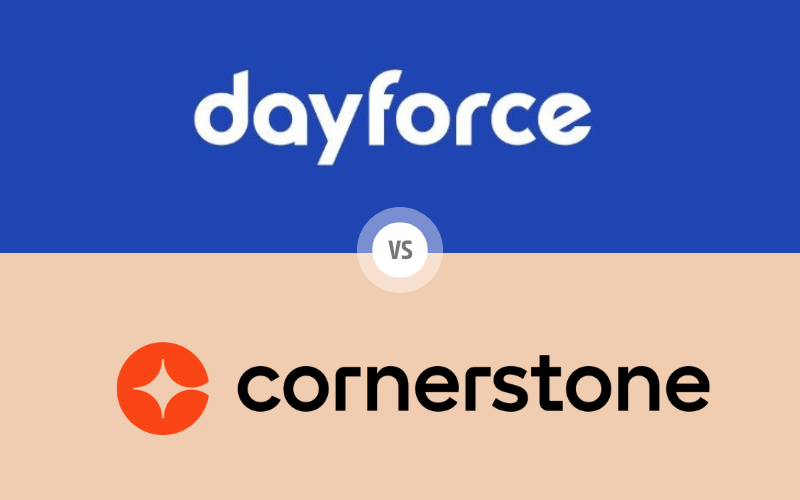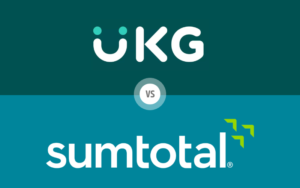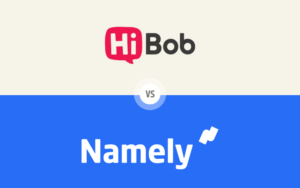Choosing between Dayforce vs Cornerstone for your Human Capital Management (HCM) needs can be challenging, given the strengths and unique features of each platform. This blog post provides a comprehensive comparison of Dayforce and Cornerstone across various critical aspects, including user interface, core HR functions, payroll management, and more. Our goal is to help you understand which system may be best suited to your organization’s specific requirements, ensuring you make an informed decision that aligns with your strategic HR objectives. Whether you prioritize seamless integration, real-time processing capabilities, or extensive learning and development tools, this guide will navigate you through the key differences and strengths of both HCM systems.
Table of Contents
User Interface and User Experience
Choosing the right Human Capital Management (HCM) software often hinges on the user interface (UI) and user experience (UX). These aspects are crucial as they directly affect user adoption rates and overall productivity. In this focused comparison of “Dayforce vs Cornerstone,” we explore how each platform approaches UI and UX to cater to different organizational needs.

Dayforce User Interface and User Experience
Dayforce is designed to offer a straightforward and intuitive user experience that prioritizes ease of use. The platform boasts a modern interface with clean lines and an organized layout that reduces the learning curve for new users. Its key strength lies in its ability to present complex functionalities in an accessible manner, which can be particularly advantageous for organizations that need efficient, hassle-free software navigation.
Key Features of Dayforce UI/UX:
- Intuitive Layout: The interface is user-friendly, designed to facilitate quick access to various features without overwhelming users.
- Adaptive Design: Ensures a consistent experience across all devices, crucial for employees accessing the system remotely.
- Personalized Dashboards: Users can customize their views to display the most relevant information, improving their efficiency and effectiveness.
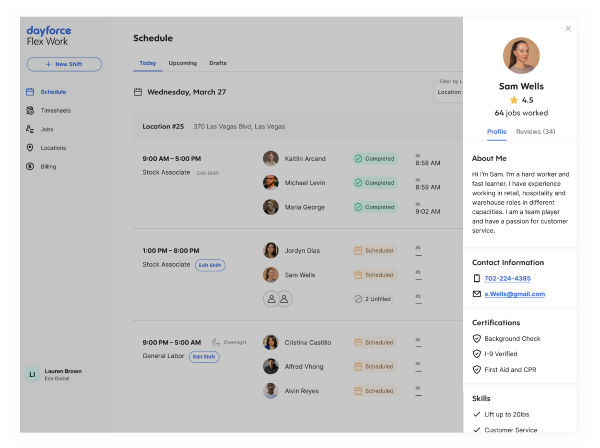
Cornerstone User Interface and User Experience
Contrasting with Dayforce, Cornerstone offers a highly adaptable interface that allows for extensive customization. This platform is ideal for organizations that have specific needs based on varied operational roles or complex processes. Cornerstone’s UI/UX is geared towards enhancing user engagement through tailored experiences, which can lead to improved job performance and satisfaction.
Key Features of Cornerstone UI/UX:
- Customization at Every Level: From the dashboard to the reporting tools, users can modify almost every aspect of their interface.
- Engaging User Tools: Incorporates interactive elements that foster a more dynamic interaction with the system.
- Mobile Optimization: Similar to Dayforce, it provides a robust mobile experience, ensuring users can perform tasks effectively, regardless of location.
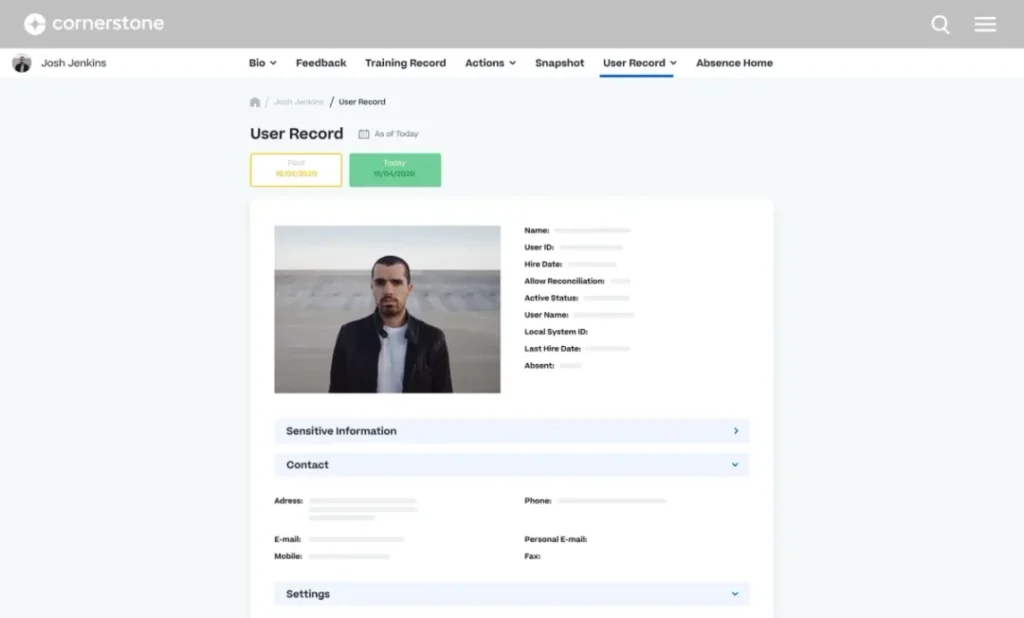
Comparison and Conclusion
When evaluating Dayforce vs Cornerstone on the fronts of user interface and user experience, the decision largely depends on the specific needs and structure of your organization.
- Dayforce is particularly well-suited for organizations that require a clean, straightforward solution that employees can quickly adapt to without a steep learning curve. Its intuitive design minimizes training time and boosts productivity by allowing users to navigate its features with ease. This makes Dayforce an excellent choice for businesses that prioritize efficiency and simplicity in their operations.
- Cornerstone, on the other hand, stands out for its customization capabilities. It caters exceptionally well to larger organizations or those with specialized workflows, where different departments or teams might require distinct interfaces tailored to their unique tasks and responsibilities. The ability to deeply customize the platform means that it can grow and adapt with the organization, potentially offering a better long-term return on investment for companies with evolving needs.
Final Thoughts
In summary, if your priority is obtaining an HCM system that is easy to use right out of the box, Dayforce might be the more suitable option. However, if your organization values a platform that can be intricately customized to different user requirements and evolve with your business, Cornerstone would be the better fit.
Both platforms offer robust UI/UX capabilities, but aligning their strengths with your organization’s priorities will help ensure you choose the solution that best supports your operational goals and enhances overall workforce management.
Core HR Functions
Core Human Resources (HR) functions are the backbone of any Human Capital Management (HCM) system, essential for streamlining the day-to-day management of HR activities. In this section, we delve into how Dayforce and Cornerstone handle these core functions, comparing their features to help you determine which system might be the better fit for your organization.

Dayforce Core HR Functions
Dayforce offers a robust suite of core HR functions designed to handle everything from employee information management to complex HR processes. The platform excels in integrating these functions seamlessly, providing a unified solution that enhances overall HR operations.
Key Features of Dayforce Core HR Functions:
- Comprehensive Employee Records: Dayforce maintains detailed and easily accessible employee profiles that consolidate all essential data in one place.
- Real-Time Data Processing: The system updates information in real-time, ensuring that HR decisions are based on the latest data available.
- Advanced Workforce Analytics: Dayforce provides powerful analytics tools that help HR professionals make informed decisions by analyzing trends and metrics within the workforce.
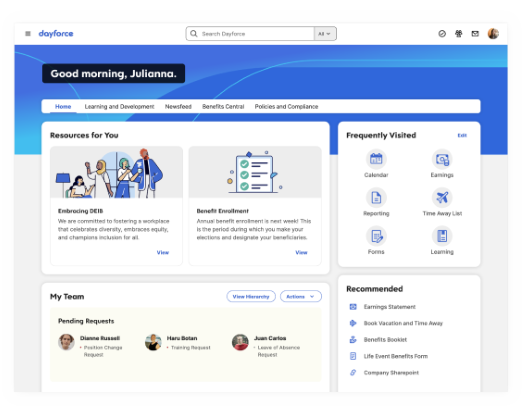
Cornerstone Core HR Functions
Cornerstone also offers extensive core HR capabilities, with a particular focus on scalability and customization. This makes it an ideal choice for growing organizations that require flexibility in their HR systems to adapt to changing business needs.
Key Features of Cornerstone Core HR Functions:
- Flexible Employee Management: Cornerstone allows for highly customizable employee management, accommodating various workflows and business rules.
- Learning and Development Integration: Unlike many other HCM systems, Cornerstone deeply integrates core HR functions with learning and development modules, facilitating continuous employee growth and compliance training.
- Robust Compliance Tools: The platform includes comprehensive tools to help manage compliance with both local and global regulations, reducing the risk of non-compliance.
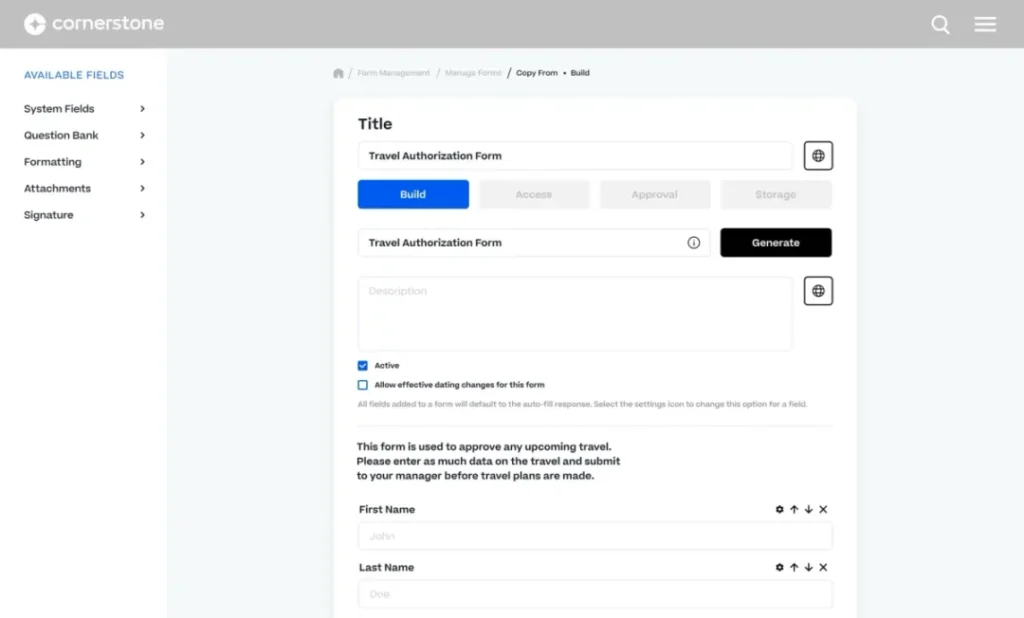
Comparison and Conclusion
When comparing Dayforce vs Cornerstone in terms of core HR functions, the choice between the two often depends on the specific needs of your organization:
- Dayforce is well-suited for companies that require a powerful, all-in-one solution that provides real-time data across all HR functions. Its strength lies in its ability to offer comprehensive insights into the workforce, making it ideal for data-driven organizations that rely heavily on analytics to guide HR strategies.
- Cornerstone is particularly beneficial for organizations that prioritize learning and development as a part of their core HR functions. Its ability to integrate employee management with continuous learning opportunities makes it a strong contender for businesses focused on long-term employee growth and development.
Final Thoughts
In summary, if your organization needs a robust, analytics-driven HCM system that can provide immediate updates and insights, Dayforce could be the better choice. However, if you are looking to seamlessly combine HR management with employee development initiatives, Cornerstone offers significant advantages.
Both Dayforce and Cornerstone deliver strong core HR functionality but cater to different organizational priorities and needs. Aligning these platforms with your strategic HR goals will help ensure that you select the system best equipped to support your business’s operational and developmental requirements.
Payroll Management
Effective payroll management is a critical component of any Human Capital Management (HCM) system. It ensures that employees are paid accurately and on time, while also complying with various tax laws and regulations. In this comparison of “Dayforce vs Cornerstone,” we evaluate how each platform handles payroll management, highlighting their strengths and functionalities.

Dayforce Payroll Management
Dayforce is renowned for its robust payroll capabilities, which are designed to simplify the complex process of payroll administration. The system integrates payroll with other core HR functions to ensure accuracy and efficiency across the board.
Key Features of Dayforce Payroll Management:
- Real-Time Processing: Dayforce processes payroll in real-time, which allows for instant updates and adjustments. This feature is particularly useful for correcting errors before they affect a payroll run.
- Comprehensive Compliance: The platform stays current with changes in legislation, ensuring that payroll practices comply with local, state, and federal laws.
- Automated Tax Calculations: Dayforce automates the calculation of taxes, which reduces the risk of errors and saves significant time for payroll administrators.
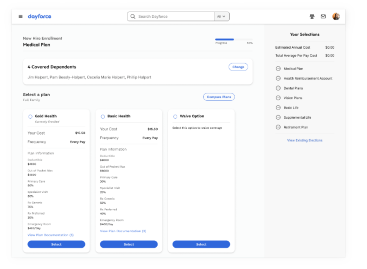
Cornerstone Payroll Management
While Cornerstone is primarily recognized for its learning and development strengths, it also offers capable payroll management features that integrate well with its suite of HR functions. However, unlike Dayforce, Cornerstone’s payroll features might be less extensive but still cater effectively to standard payroll needs.
Key Features of Cornerstone Payroll Management:
- Integration with Core HR: Cornerstone integrates payroll management with other HR functions, which helps maintain data consistency and accuracy.
- Configurable Payroll Workflows: Users can configure payroll workflows to match their organizational policies, adding flexibility to how payroll is managed.
- Employee Self-Service: Employees can access their pay stubs and tax documents through a user-friendly portal, which reduces administrative overhead for HR departments.
Comparison and Conclusion
Choosing between Dayforce vs Cornerstone for payroll management should consider the complexity of your payroll needs:
- Dayforce is ideal for organizations that require a comprehensive, real-time payroll solution capable of handling complex payroll requirements and ensuring compliance with the latest regulations. Its strength in real-time processing and automated tax calculations makes it a standout choice for businesses that need robust, error-free payroll operations.
- Cornerstone, while offering solid payroll capabilities, might be more suitable for organizations that do not require as extensive payroll functionalities as those provided by Dayforce. Its integration with core HR and customizable workflows are sufficient for businesses with straightforward payroll processes.
Final Thoughts
In summary, if your organization’s priority is managing complex payroll requirements with precision and real-time capabilities, Dayforce is likely the better choice. However, if your payroll needs are more straightforward or you are looking for an HCM system that integrates payroll with comprehensive learning and development tools, Cornerstone offers valuable features that could align well with your business requirements.
Both platforms provide effective payroll management solutions, but the right choice will depend on the specific payroll challenges your organization faces and how these systems integrate with your overall HR strategy.
Time and Attendance Tracking
Time and attendance tracking is essential for managing employee schedules, ensuring compliance with labor laws, and facilitating accurate payroll processing. This functionality can significantly influence the operational efficiency of any organization. In this comparison of “Dayforce vs Cornerstone,” we explore each platform’s capabilities in handling time and attendance, helping you decide which system might best meet your needs.

Dayforce Time and Attendance Tracking
Dayforce provides a comprehensive solution for time and attendance tracking, designed to accommodate the complexities of modern workforce management. The system is known for its real-time processing capabilities, which allow immediate visibility into employee hours and activities.
Key Features of Dayforce Time and Attendance Tracking:
- Real-Time Updates: Dayforce updates attendance records in real time, giving managers up-to-the-minute insights into employee status, which is crucial for dynamic scheduling and labor law compliance.
- Advanced Scheduling: The platform offers sophisticated tools for creating and managing employee schedules that can adapt to varying business needs, enhancing operational efficiency.
- Labor Compliance: Dayforce includes features that help ensure compliance with labor regulations, reducing the risk of costly legal issues related to overtime and other labor practices.
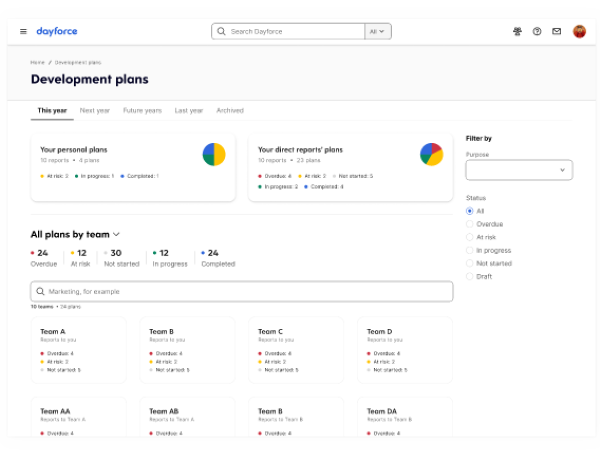
Cornerstone Time and Attendance Tracking
Cornerstone also offers robust time and attendance tracking features, with a focus on integration with its overall talent management system. This integration helps streamline workflows and improves data consistency across HR processes.
Key Features of Cornerstone Time and Attendance Tracking:
- Integrated Workforce Management: Cornerstone’s time and attendance tools are fully integrated with other HR functions, such as payroll and performance management, ensuring consistent and accurate data across the board.
- Customizable Features: The system allows for significant customization to address the specific time tracking needs of different organizations, supporting unique work patterns and compliance requirements.
- Employee Self-Service Portal: Employees can easily clock in and out, view their schedules, and submit time-off requests through a user-friendly interface, which empowers them and reduces administrative burden.
Comparison and Conclusion
When deciding between Dayforce vs Cornerstone for time and attendance tracking, consider the following:
- Dayforce is particularly effective for organizations that require detailed, real-time insights into their workforce’s time and attendance. Its capabilities for handling complex scheduling and compliance make it a strong choice for sectors with variable staffing needs, such as retail or healthcare.
- Cornerstone may be more appealing to organizations that value system integration and customizable features. Its ability to seamlessly integrate time tracking with other HR functions makes it ideal for companies looking to manage all employee data within a single platform.
Final Thoughts
Choosing the right platform for time and attendance tracking depends largely on your organization’s specific needs. If real-time data and compliance are your top priorities, Dayforce offers powerful tools that are hard to match. However, if you prefer a system that aligns time and attendance with broader HR capabilities, Cornerstone provides a versatile and integrated solution.
Both Dayforce and Cornerstone offer compelling features for time and attendance management, but aligning their functionalities with your operational requirements will ensure you choose the system that best supports your organization’s goals.
Benefits Administration
Benefits administration is a critical component of Human Capital Management (HCM) systems, dealing with the management of employee benefits like health insurance, retirement plans, and other perks. Effective benefits administration not only ensures regulatory compliance but also enhances employee satisfaction and retention. Here, we compare “Dayforce vs Cornerstone” in terms of their capabilities to manage benefits efficiently and effectively.

Dayforce Benefits Administration
Dayforce offers a robust benefits administration module that simplifies the management of complex benefits packages, ensuring both compliance and accessibility. The platform is designed to handle diverse benefit plans and automate many of the processes involved, from enrollment through to reporting.
Key Features of Dayforce Benefits Administration:
- Automated Enrollment: Dayforce streamlines the enrollment process, guiding employees through available benefits options with tools that help them make informed choices based on their needs and life events.
- Comprehensive Reporting: The system provides detailed reports on benefits enrollment and utilization, which helps HR teams optimize their benefits offerings and manage costs effectively.
- Regulatory Compliance: Dayforce stays updated with the latest regulations, automatically adjusting benefits policies to meet legal requirements, thus reducing the risk of compliance issues.
Cornerstone Benefits Administration
Cornerstone’s approach to benefits administration focuses on integration with its overall talent management suite, providing a seamless user experience and comprehensive data management. While it may not offer as extensive functionalities as Dayforce in this area, it still delivers solid capabilities tailored to streamline benefits processes.
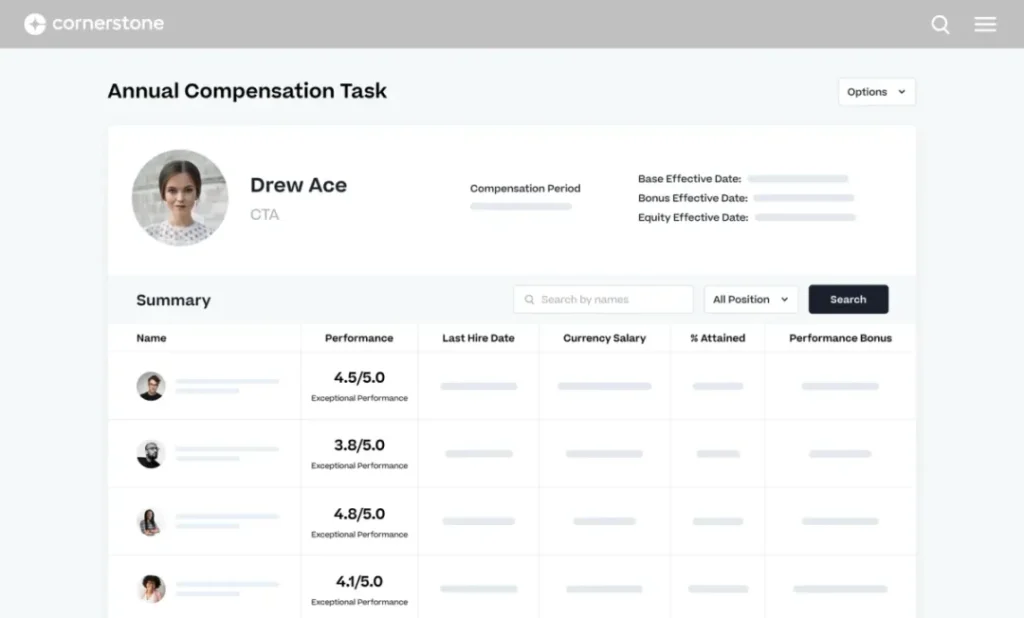
Key Features of Cornerstone Benefits Administration:
- Integrated Benefits Data: All benefits data in Cornerstone is integrated with other HR functions, which improves accuracy and reduces administrative overhead by eliminating data silos.
- Employee Self-Service: Cornerstone provides a robust portal where employees can manage their benefits, view plan information, and make changes as necessary, empowering them to take charge of their benefits.
- Customizable Benefits Plans: The platform allows for customization of benefits plans to meet diverse employee needs and organizational policies, providing flexibility in benefits management.
Comparison and Conclusion
When evaluating Dayforce vs Cornerstone for benefits administration, the decision often hinges on the specific needs of your organization:
- Dayforce is particularly strong in managing complex benefits landscapes, offering advanced features like automated enrollment and comprehensive compliance tools. Its capabilities make it ideal for large organizations or those with diverse and dynamic benefits needs, where managing scalability and compliance is crucial.
- Cornerstone, on the other hand, might appeal more to organizations that prioritize a seamless integration of benefits administration with other HR functions. Its focus on providing a unified platform can be particularly beneficial for companies looking to maintain consistency across all aspects of HR management.
Final Thoughts
Both Dayforce and Cornerstone offer effective solutions for benefits administration, but they cater to slightly different organizational priorities. Dayforce excels with its specialized features for managing complex benefits packages efficiently, while Cornerstone offers a more integrated approach that may be preferred by organizations looking for consistency and ease of use across their HR systems.
Choosing the right platform depends on evaluating how the specific features of each can meet your organizational needs in benefits administration, factoring in aspects like size, complexity of benefits, and integration requirements.
Performance Management
Effective performance management is crucial for motivating employees, aligning individual goals with company objectives, and driving organizational success. In this section, we compare “Dayforce vs Cornerstone” to see how each platform supports performance management through their Human Capital Management (HCM) systems.

Dayforce Performance Management
Dayforce offers a comprehensive performance management system that enables continuous feedback and goal alignment, designed to enhance the overall productivity and engagement of employees.
Key Features of Dayforce Performance Management:
- Continuous Feedback: Dayforce facilitates ongoing communication between employees and managers, allowing for real-time feedback and regular performance check-ins. This helps in addressing issues promptly and reinforcing positive behaviors throughout the year.
- Goal Management: The platform provides tools for setting, tracking, and updating individual and team goals that are aligned with the strategic objectives of the organization. This ensures everyone is working towards common ends.
- Performance Reviews: Dayforce simplifies the review process with customizable templates and automated workflows, which help streamline evaluations and reduce administrative burdens.
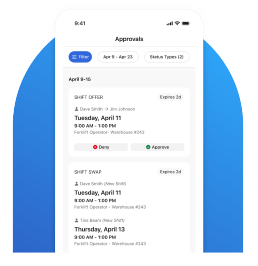
Cornerstone Performance Management
Cornerstone’s performance management module is deeply integrated with its learning and development features, providing a unique approach that emphasizes employee growth and development as part of the performance review process.
Key Features of Cornerstone Performance Management:
- Development-Driven Reviews: Cornerstone links performance reviews with learning opportunities, allowing employees to enroll in recommended courses and training directly through their performance review interface. This integration supports career development and skill enhancement directly aligned with performance outcomes.
- 360-Degree Feedback: The system supports comprehensive feedback mechanisms, involving peers, subordinates, and managers, to provide a well-rounded view of employee performance. This helps in creating a more accurate and holistic assessment of an employee’s contributions.
- Robust Analytics: With advanced analytics tools, Cornerstone provides insights into performance trends and the effectiveness of development interventions, aiding better decision-making and strategy formulation.
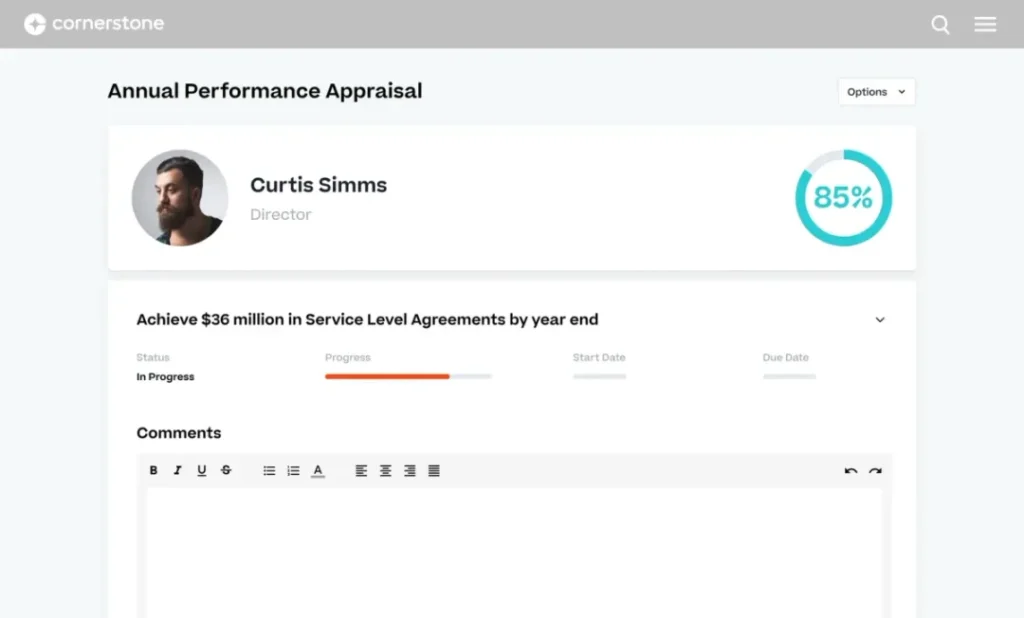
Comparison and Conclusion
Choosing between Dayforce vs Cornerstone for performance management depends significantly on your organization’s specific performance strategy:
- Dayforce is well-suited for organizations that prioritize a straightforward, efficient performance management process with strong emphasis on real-time feedback and goal alignment. Its features support a dynamic approach to managing employee performance, making it ideal for fast-paced or rapidly changing environments.
- Cornerstone offers a more holistic approach by integrating performance management with employee development. This is particularly beneficial for organizations that view performance reviews as an opportunity for employee growth and development, rather than just evaluation.
Final Thoughts
Both Dayforce and Cornerstone provide robust tools for performance management, but they cater to different aspects of employee engagement and development. Dayforce might be preferable for companies looking for a more traditional, yet agile performance management system, while Cornerstone could be the better choice for organizations that emphasize continuous learning and development as part of their performance strategy.
Your selection should align with how each platform’s features can best support your organizational goals, ensuring that your performance management system not only evaluates but also motivates and develops your workforce.
Talent Management and Recruiting
Talent management and recruiting are vital for attracting, developing, and retaining the best employees to drive organizational success. Efficient systems in these areas can significantly enhance an organization’s ability to source top talent and ensure their growth aligns with business goals. Here, we explore the capabilities of “Dayforce vs Cornerstone” in managing talent and recruitment processes.

Dayforce Talent Management and Recruiting
Dayforce provides a robust talent management and recruiting system that helps streamline the hiring process from job posting to onboarding. It’s designed to enhance the recruitment experience for both candidates and HR teams, ensuring that talent acquisition is both efficient and effective.
Key Features of Dayforce Talent Management and Recruiting:
- Comprehensive Applicant Tracking System (ATS): Dayforce includes a full-featured ATS that automates many aspects of the recruitment process, such as tracking applications, screening candidates, and scheduling interviews. This helps reduce the time-to-hire and improves the overall efficiency of the recruitment process.
- Integrated Onboarding: The platform ensures a smooth transition for new hires by integrating onboarding directly with the recruitment process. New employees can begin their onboarding tasks even before their first day, which helps them acclimate more quickly and effectively.
- Succession Planning: Dayforce offers tools for planning and managing succession, ensuring that key roles within the organization are always covered. This feature helps in identifying and developing internal talent for future leadership roles.
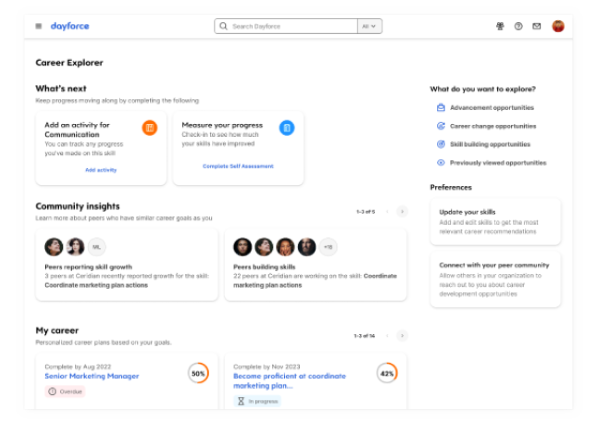
Cornerstone Talent Management and Recruiting
Cornerstone approaches talent management and recruiting with a strong emphasis on integrating these functions with overall employee development strategies. This integration helps ensure that the investment in new hires translates into long-term benefits for both the employees and the organization.
Key Features of Cornerstone Talent Management and Recruiting:
- Unified Talent Framework: Cornerstone’s system connects recruiting, learning, performance, and career development in a single platform. This holistic approach ensures that employee growth is aligned with the company’s strategic goals from the start.
- Robust Learning Integration: Candidates and new hires can access learning modules as part of the recruitment and onboarding process. This not only enhances the onboarding experience but also accelerates the time it takes for new employees to become productive.
- Advanced Analytics: The platform provides detailed analytics on all stages of the talent lifecycle, from hiring to development, which helps HR teams make data-driven decisions about their talent strategies.
Comparison and Conclusion
When comparing Dayforce vs Cornerstone for talent management and recruiting, your choice will largely depend on the specific needs and strategy of your organization:
- Dayforce is well-suited for organizations looking for a robust, efficient recruitment process integrated with comprehensive HR management tools. Its strengths in applicant tracking, onboarding, and succession planning make it a good fit for businesses that need a streamlined, effective approach to talent acquisition and management.
- Cornerstone is ideal for organizations that view recruitment as a part of a broader talent development strategy. Its integration of recruiting with learning and development is particularly beneficial for companies focused on long-term employee growth and retention.
Final Thoughts
Both Dayforce and Cornerstone offer powerful solutions for talent management and recruiting, but they cater to slightly different organizational priorities. Dayforce provides a more traditional, streamlined approach to recruitment, while Cornerstone offers a more integrated solution that ties hiring closely to development and performance management.
Selecting the right platform should involve a careful consideration of how each system’s features align with your strategic HR goals, ensuring that your talent management and recruiting processes support your overall business objectives effectively.
Learning and Development
Learning and development are critical for fostering employee growth, improving skills, and increasing engagement within an organization. Effective learning management systems are key to delivering educational content and tracking progress. This section compares “Dayforce vs Cornerstone” in their approach to learning and development within their Human Capital Management (HCM) systems.

Dayforce Learning and Development
Dayforce offers integrated learning solutions designed to be accessible and practical for all employees. The platform provides tools to help organizations create, manage, and deliver educational content that supports both individual career growth and corporate goals.
Key Features of Dayforce Learning and Development:
- Flexible Learning Paths: Dayforce allows organizations to create customized learning paths that align with job roles and career progression. This feature ensures that learning is relevant and targeted to the needs of the workforce.
- Interactive Learning Experiences: The platform supports interactive learning modules, including videos, quizzes, and virtual classrooms, enhancing the engagement and retention of knowledge.
- Real-Time Tracking and Reporting: Dayforce offers comprehensive tracking and reporting capabilities, enabling managers and HR professionals to monitor progress and compliance with training requirements. This helps in assessing the effectiveness of training programs and making necessary adjustments.
Cornerstone Learning and Development
Cornerstone is renowned for its robust learning and development platform, which is considered one of its core strengths. The system is built to support a culture of continuous learning with an extensive range of features designed to deliver personalized and scalable learning experiences.
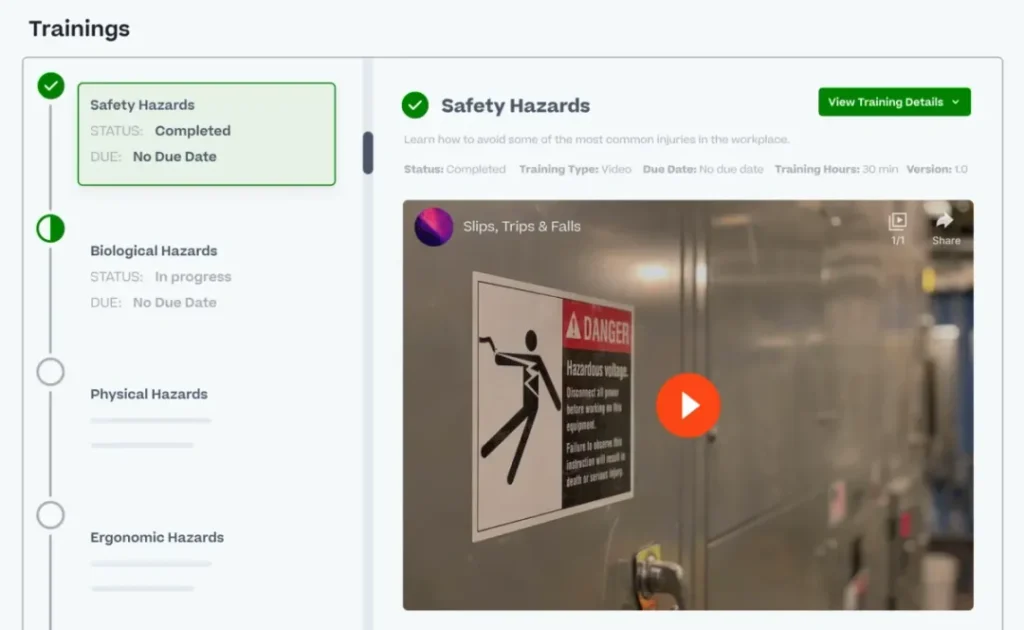
Key Features of Cornerstone Learning and Development:
- Extensive Course Library: Cornerstone provides access to a wide range of learning materials, including courses from leading content providers. This extensive library allows organizations to offer diverse training options that cater to various learning preferences and needs.
- Career Development Integration: Learning and development in Cornerstone are closely linked with career development tools, allowing employees to directly connect learning activities with their career aspirations and growth plans.
- Advanced Analytics and Insights: The platform includes powerful analytics tools that provide insights into learning trends, employee engagement, and the impact of training on performance. This data is crucial for refining learning strategies and demonstrating ROI.
Comparison and Conclusion
Choosing between Dayforce vs Cornerstone for learning and development depends largely on your organization’s specific learning strategy and how it integrates with overall HR functions:
- Dayforce offers strong functionality for organizations that need a straightforward, integrated approach to learning management. Its real-time tracking and flexible learning paths make it suitable for businesses looking to efficiently manage and align learning with performance and development goals.
- Cornerstone excels in providing a comprehensive and immersive learning experience that is particularly well-suited for organizations that view learning as a strategic component of employee development and engagement. Its vast course library and advanced analytics are ideal for companies committed to fostering a culture of continuous improvement and learning.
Final Thoughts
Both Dayforce and Cornerstone bring significant strengths to learning and development, but their approaches cater to different needs. Dayforce is effective for streamlined, goal-oriented learning management, while Cornerstone offers more in-depth and varied learning experiences aligned with long-term career development. Your choice should align with the depth and breadth of learning initiatives your organization intends to implement and how these integrate with your overall talent management strategy.
Reporting and Analytics
In today’s data-driven world, the ability to harness and interpret HR data through reporting and analytics is crucial for strategic decision-making. Effective reporting tools can help organizations understand workforce dynamics, optimize processes, and forecast future trends. This comparison of “Dayforce vs Cornerstone” examines how each platform manages reporting and analytics within their Human Capital Management (HCM) systems.

Dayforce Reporting and Analytics
Dayforce provides a comprehensive analytics suite that empowers organizations to transform raw HR data into actionable insights. The platform is designed to support real-time decision-making and strategic planning.
Key Features of Dayforce Reporting and Analytics:
- Real-Time Data Access: Dayforce offers real-time data across all modules, ensuring that reports reflect the most current information available. This capability is crucial for making timely decisions based on the latest data.
- Customizable Dashboards: Users can customize dashboards to highlight key metrics that are most relevant to their specific roles or departmental goals. This personalization helps streamline the monitoring of performance indicators.
- Advanced Analytics: Dayforce includes sophisticated analytical tools that can predict trends and model potential HR scenarios. This predictive capability allows organizations to proactively manage workforce planning and mitigate risks.
Cornerstone Reporting and Analytics
Cornerstone excels in providing robust reporting and analytics features that are integrated deeply with its learning and talent management functionalities. This integration helps in drawing comprehensive insights into the effectiveness of development programs and their impact on organizational performance.
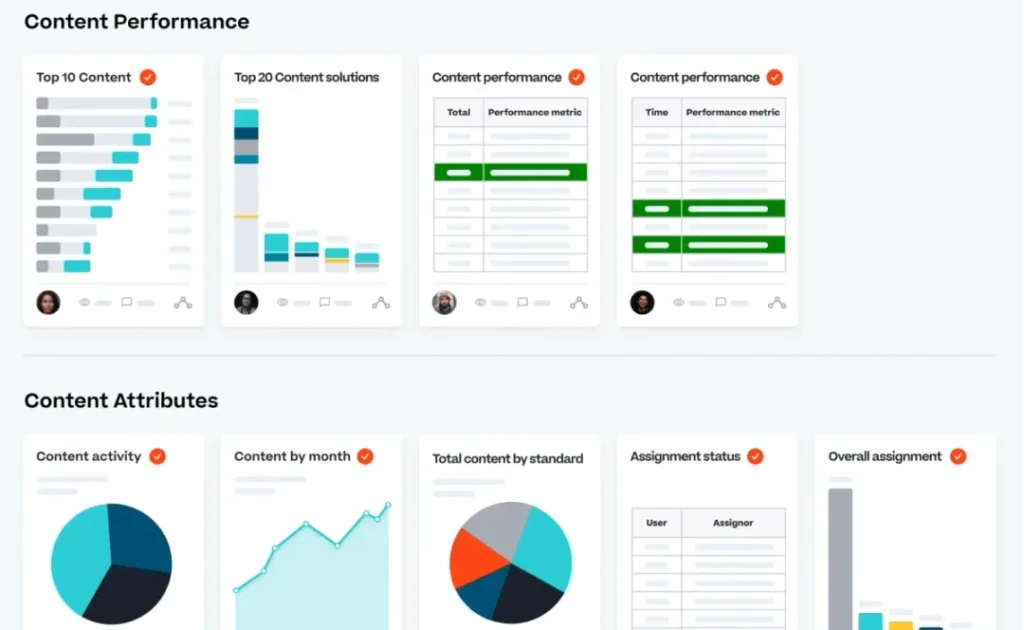
Key Features of Cornerstone Reporting and Analytics:
- Extensive Reporting Capabilities: Cornerstone allows for detailed reports on a wide range of HR activities, including learning outcomes, talent progression, and compliance status. This extensive reporting helps in assessing the impact of HR initiatives on business objectives.
- Interactive Data Visualization: The platform supports interactive data visualizations that make complex datasets easier to understand and communicate. These visual tools are invaluable for engaging stakeholders and facilitating data-driven discussions.
- Benchmarking Tools: Cornerstone provides benchmarking data that organizations can use to compare their performance against industry standards. This feature is especially useful for identifying strengths and areas for improvement.
Comparison and Conclusion
When deciding between Dayforce vs Cornerstone for reporting and analytics, consider the nature of the data you need and how it supports your strategic HR and business goals:
- Dayforce is ideal for organizations that require real-time data integration across all HR functions. Its real-time reporting, advanced analytics, and customizable dashboards make it particularly effective for operational decision-making and immediate data needs.
- Cornerstone is more suited for organizations that prioritize depth and integration of learning and development data within their overall HR reporting. Its comprehensive reporting capabilities, combined with interactive data visualization and benchmarking tools, make it excellent for long-term strategic planning and performance evaluation.
Final Thoughts
Both Dayforce and Cornerstone offer powerful reporting and analytics capabilities, but they cater to different organizational needs. Dayforce provides the edge in real-time data processing and advanced predictive analytics, while Cornerstone offers more in-depth integration with learning and development metrics. Your choice should align with how each platform’s reporting and analytics features can best support your organization’s specific strategic objectives and data utilization strategies.
Compliance and Security
Compliance and security in Human Capital Management (HCM) systems are critical for protecting sensitive employee data and ensuring that organizations meet regulatory standards. Effective compliance and security measures prevent data breaches and help maintain trust with employees and stakeholders. This section explores how “Dayforce vs Cornerstone” addresses these important aspects within their platforms.

Dayforce Compliance and Security
Dayforce places a strong emphasis on maintaining robust security protocols and ensuring compliance with various legal frameworks. The platform is designed to help organizations manage their compliance needs effectively, reducing the risk of penalties and other compliance-related issues.
Key Features of Dayforce Compliance and Security:
- Automated Compliance Updates: Dayforce continuously updates its system to reflect the latest legal requirements, ensuring that your organization remains compliant with ever-changing labor laws and regulations.
- Data Encryption: All data within Dayforce is encrypted both in transit and at rest, securing sensitive information against unauthorized access and breaches.
- Audit Trails: The platform maintains comprehensive audit trails that record all user activities, providing clear visibility into data modifications and access. This feature is essential for tracking compliance and understanding the history of data changes.
Cornerstone Compliance and Security
Cornerstone also recognizes the importance of compliance and security, incorporating advanced features that protect data integrity and assist organizations in meeting regulatory obligations.
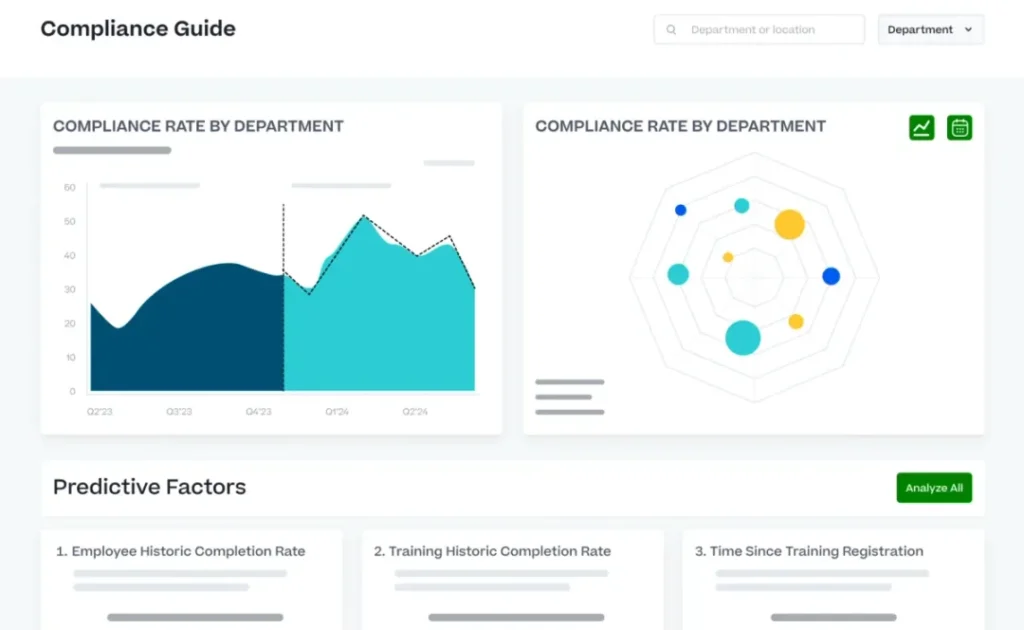
Key Features of Cornerstone Compliance and Security:
- Global Compliance Support: Cornerstone supports a broad range of international compliance standards, making it suitable for global organizations that need to navigate complex regulatory landscapes.
- Role-Based Access Controls (RBAC): The system implements strict role-based access controls that ensure employees can only access information pertinent to their job functions. This minimizes the risk of internal data breaches.
- Regular Security Audits: Cornerstone undergoes regular security audits and complies with industry standards to ensure its defenses remain effective against evolving security threats.
Comparison and Conclusion
Choosing between Dayforce vs Cornerstone for compliance and security should be based on your organization’s specific needs, especially considering the scale and geographical spread of your operations:
- Dayforce is particularly effective for organizations that require real-time compliance updates and robust audit trails. Its automated compliance features and strong encryption protocols make it a reliable choice for companies that prioritize up-to-the-minute compliance and high data security standards.
- Cornerstone may be more appealing to global organizations that need comprehensive support for international regulations. Its extensive compliance capabilities, coupled with sophisticated RBAC and regular security audits, provide a secure environment that adapts to diverse regulatory requirements.
Final Thoughts
Both Dayforce and Cornerstone offer formidable compliance and security features, but their strengths cater to different types of organizations. Dayforce excels with its automated compliance features and strong encryption, making it ideal for businesses needing stringent security measures and up-to-date compliance. Conversely, Cornerstone is better suited for organizations operating across multiple jurisdictions, requiring robust global compliance support and detailed access controls.
Your decision should align with how well each platform’s compliance and security features meet your organizational requirements, ensuring that you maintain legal compliance and protect sensitive data effectively.
Integration and Compatibility
In the complex landscape of modern enterprise technology, integration and compatibility of Human Capital Management (HCM) systems with other business tools are crucial. They ensure seamless operation across various platforms, enhancing efficiency and minimizing data silos. This section compares “Dayforce vs Cornerstone” in terms of how well each platform integrates with other software systems and their overall compatibility with external applications.

Dayforce Integration and Compatibility
Dayforce is designed to offer robust integration capabilities that help organizations streamline their HR processes by connecting with various external systems. The platform’s flexibility in integration supports a cohesive technology ecosystem, crucial for businesses utilizing multiple software solutions.
Key Features of Dayforce Integration and Compatibility:
- APIs and Web Services: Dayforce provides a wide range of APIs and web services, enabling custom integrations with third-party systems. This flexibility allows organizations to tailor the platform to their specific needs and connect seamlessly with ERP, CRM, and other essential business systems.
- Pre-built Connectors: The platform includes a variety of pre-built connectors for popular software, reducing the need for custom development and speeding up the integration process.
- Data Synchronization: Dayforce ensures consistent data across all connected systems, reducing errors and duplication. This synchronization supports accurate reporting and analytics, critical for informed decision-making.
Cornerstone Integration and Compatibility
Cornerstone emphasizes a seamless integration experience, particularly highlighting its compatibility with various learning and development tools. The platform is built to function as a central hub for all talent management activities, linking various aspects of HR to foster a unified approach to workforce management.
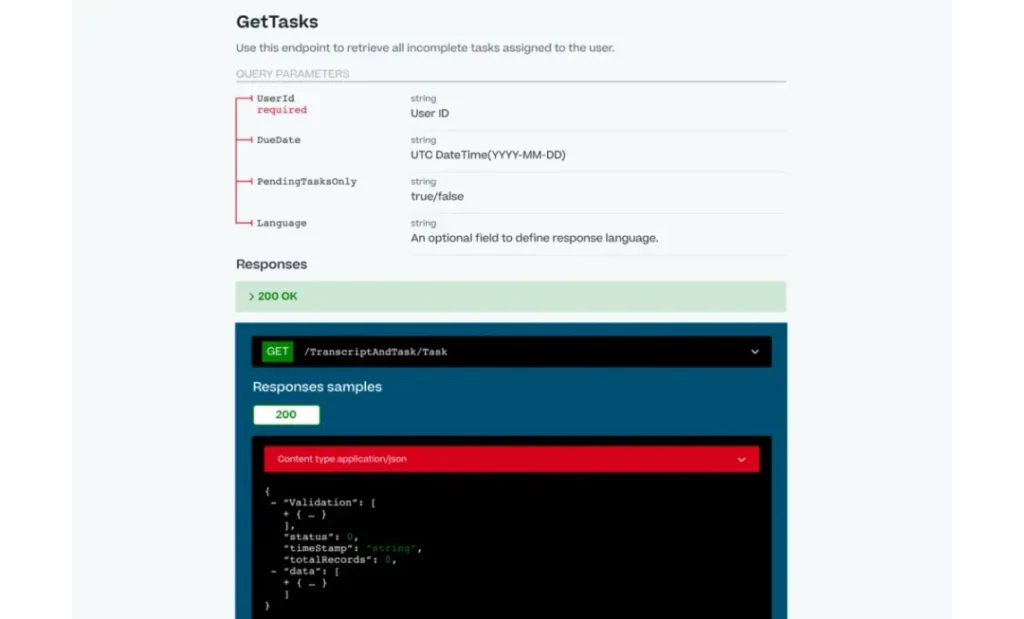
Key Features of Cornerstone Integration and Compatibility:
- Unified Talent Management System: Cornerstone’s core advantage in integration is its ability to unify all elements of talent management — from recruiting and onboarding to learning and performance — into a single platform. This integration enhances user experience and operational efficiency.
- Scalable Integration Framework: The platform supports scalable integration with external systems, accommodating growth and changes within the organization. This means that as businesses expand or shift strategies, their HCM system can adapt seamlessly.
- Extensive Compatibility: Cornerstone works with a broad range of other software systems, including advanced compatibility with various content providers for learning and development. This compatibility is crucial for organizations that rely heavily on continuous employee training and upskilling.
Comparison and Conclusion
When evaluating Dayforce vs Cornerstone for integration and compatibility, the choice will largely depend on your organization’s existing technology stack and future needs:
- Dayforce is ideal for businesses looking for robust, flexible integration capabilities that allow them to maintain a cohesive technology ecosystem. Its strong API offerings and data synchronization features are particularly beneficial for organizations that need real-time data flows across various systems.
- Cornerstone is particularly well-suited for organizations that focus on developing and retaining talent through continuous learning and performance management. Its unified talent management system and extensive compatibility with learning content providers make it a compelling choice for companies prioritizing comprehensive talent development.
Final Thoughts
Both Dayforce and Cornerstone offer strong integration and compatibility features, but they serve different strategic purposes. Dayforce provides the technical flexibility needed for complex integrations across a diverse software landscape, while Cornerstone offers a more focused integration within the realm of talent management. Your decision should align with your primary business needs, ensuring that the HCM system not only fits within your current technology environment but also supports your long-term business goals.
Customer Support and Service
Effective customer support and service are essential for maximizing the value of Human Capital Management (HCM) systems like Dayforce and Cornerstone. Strong support can significantly enhance user satisfaction, facilitate smoother system implementation, and ensure that issues are resolved promptly. This section examines how “Dayforce vs Cornerstone” stack up in providing customer support and services to their users.

Dayforce Customer Support and Service
Dayforce is known for offering comprehensive customer support aimed at ensuring clients can effectively utilize all aspects of their HCM system. Their support structure is designed to address issues quickly and efficiently, minimizing downtime and enhancing user experience.
Key Features of Dayforce Customer Support and Service:
- 24/7 Support: Dayforce provides round-the-clock support to address critical issues any time they arise, crucial for businesses operating across different time zones.
- Dedicated Support Teams: Dayforce assigns dedicated support teams to clients, ensuring that support personnel are familiar with the specific configuration and needs of each organization.
- Extensive Training Resources: Dayforce offers a wealth of training materials, including webinars, detailed documentation, and live training sessions, to help users fully understand and effectively use the system.
Cornerstone Customer Support and Service
Cornerstone also places a high priority on customer support, with a focus on comprehensive educational resources and proactive service management. Their approach is centered on not only resolving issues but also on empowering users through education and best practices.
Key Features of Cornerstone Customer Support and Service:
- Proactive Support: Cornerstone anticipates potential issues and offers proactive support to prevent problems before they affect the organization. This includes regular system health checks and updates.
- Community Access: Users gain access to a vibrant community of other Cornerstone users and experts. This community can be an invaluable resource for troubleshooting, tips, and sharing best practices.
- Customized Training: Beyond generic training resources, Cornerstone provides options for customized training sessions that are tailored to the specific needs and contexts of different organizations.
Comparison and Conclusion
When comparing Dayforce vs Cornerstone for customer support and service, both platforms offer robust systems, but they cater to slightly different user needs:
- Dayforce excels with its 24/7 support and dedicated teams, making it ideal for organizations that require constant access to support and highly personalized service interactions. This level of support is especially beneficial for businesses that rely heavily on their HCM system for daily operations.
- Cornerstone is particularly strong in providing extensive educational resources and a supportive community, which can be more appealing to organizations that prefer to build internal expertise and leverage community-driven solutions and support.
Final Thoughts
Choosing between Dayforce and Cornerstone for customer support should depend on your organization’s specific support preferences and how you value direct support versus community and educational resources. Dayforce may be preferable for those who value immediate and personalized assistance, while Cornerstone might be the better choice for organizations looking for extensive learning opportunities and community engagement to maximize their HCM system’s value.
Pricing and Cost-effectiveness
Understanding the pricing and cost-effectiveness of Human Capital Management (HCM) systems like Dayforce and Cornerstone is crucial for organizations aiming to maximize their HR investments. This comparison examines how “Dayforce vs Cornerstone” structures their pricing and the overall value they offer, helping you decide which platform might better suit your budget and HR needs.

Dayforce Pricing and Cost-effectiveness
Dayforce offers a pricing model that is typically based on a per-employee-per-month fee, which can vary depending on the depth and breadth of functionalities each organization chooses to implement. Their approach is designed to provide flexibility and scalability to businesses of all sizes.
Key Features of Dayforce Pricing and Cost-effectiveness:
- Scalable Pricing Model: Dayforce’s pricing adjusts based on the number of employees and specific modules used, allowing companies to scale services up or down as needed.
- Integrated Solutions: Instead of charging for each module separately, Dayforce often bundles features, which can reduce the overall cost for organizations needing comprehensive HR solutions.
- Transparent Cost Structure: Dayforce aims to maintain transparency in its pricing, providing clear breakdowns of costs upfront to help companies plan their budgets without unexpected expenses.
For more information about pricing, please visit Dayforce’s website.
Cornerstone Pricing and Cost-effectiveness
Cornerstone’s pricing is also generally based on a per-user model, but with added flexibility to accommodate the extensive customization options and wide range of functionalities it offers. Their pricing strategy is intended to cater to businesses looking for a rich set of features integrated into one platform.
Key Features of Cornerstone Pricing and Cost-effectiveness:
- Customizable Packages: Businesses can choose from a variety of packages and add-ons, tailoring the solution to their specific needs while controlling costs.
- Value for Investment: Cornerstone’s comprehensive approach to talent management means that businesses can often reduce the need for additional software or systems, potentially lowering overall IT costs.
- Detailed ROI Tracking: Cornerstone provides tools that help organizations track the return on investment from their HR initiatives, aiding in justifying the cost based on performance and productivity gains.
For more information about pricing, please visit Cornerstone’s website.
Comparison and Conclusion
When comparing Dayforce vs Cornerstone on pricing and cost-effectiveness, your choice will depend on how you prioritize costs versus functionality and the specific needs of your organization:
- Dayforce might be more suitable for organizations looking for a flexible, scalable pricing model that adjusts with the size of the workforce and the selected functionalities. This makes it ideal for growing companies that expect their needs to evolve over time.
- Cornerstone could be the better option for organizations that need extensive, integrated solutions across all areas of talent management and are willing to invest more upfront in a comprehensive system that offers long-term value.
Final Thoughts
Both Dayforce and Cornerstone offer competitive pricing structures that cater to different types of organizations, but understanding the full scope of what each pricing plan includes is crucial. Consider not only the immediate costs but also the long-term value each platform will bring to your HR operations. Evaluate how their features, scalability, and support can help achieve your organization’s strategic goals, ensuring that the investment aligns with expected returns in efficiency, compliance, and employee engagement.
User Reviews and Testimonials
User reviews and testimonials are invaluable resources when evaluating Human Capital Management (HCM) systems. They provide insights into the real-world application, effectiveness, and user satisfaction of platforms like Dayforce and Cornerstone. Understanding how actual users perceive these systems can help guide your decision-making process. Here’s a comparison of “Dayforce vs Cornerstone” based on user feedback.

Dayforce User Reviews and Testimonials
Dayforce generally receives positive reviews for its robust functionality and user-friendly interface. Users often highlight the system’s comprehensive features that cover the full spectrum of HR needs, from payroll to performance management.
Key Highlights from Dayforce User Reviews:
- Ease of Use: Many users commend Dayforce for its intuitive design, which simplifies complex HR processes and makes them more accessible to users of all tech levels.
- Real-Time Processing: Customers frequently appreciate the real-time processing capabilities of Dayforce, noting that it helps in making swift decisions and updates.
- Customer Support: Reviews often mention Dayforce’s responsive customer support team, which users find helpful and accessible, providing quick resolutions to issues.
Cornerstone User Reviews and Testimonials
Cornerstone also garners largely positive reviews, particularly for its comprehensive learning and development tools, which are considered among the best in the industry. Users praise its extensive functionalities designed to enhance employee growth and organizational development.
Key Highlights from Cornerstone User Reviews:
- Learning and Development: Users consistently highlight the strength of Cornerstone’s learning modules, appreciating the wide range of available courses and the integration of learning with other HR functions.
- Customization Options: Customers value the ability to customize various aspects of the platform to fit their organization’s unique needs, though some note that this can sometimes lead to a steeper learning curve.
- Integration Capabilities: Testimonials often point to Cornerstone’s effective integration with other systems, which facilitates a smoother workflow across different HR and business functions.
Comparison and Conclusion
User feedback for both Dayforce and Cornerstone highlights different strengths which might cater to varying organizational priorities:
- Dayforce is well-regarded for its real-time data processing and ease of use, making it ideal for organizations that need a straightforward, efficient solution for managing complex HR functions. It’s particularly favored by users who require a robust, all-in-one platform that provides immediate operational efficiencies.
- Cornerstone is often preferred by organizations focused on employee development and training. Its powerful L&D capabilities and extensive customization make it a standout choice for companies looking to invest heavily in employee growth and retention strategies.
Final Thoughts
Considering user reviews and testimonials is crucial as they offer insights into how each system performs in real operational environments. While both Dayforce and Cornerstone receive praise for their respective strengths, your choice should align with what aspects of the HCM system are most critical to your organization’s needs. Evaluate which features and benefits are highlighted by existing users and how these align with your HR goals to make a well-informed decision.
Conclusion
Choosing between Dayforce and Cornerstone for your Human Capital Management (HCM) needs involves a detailed consideration of what each platform offers and how it aligns with your organization’s specific requirements. Both systems come highly recommended, with robust features that cater to various aspects of HR management—from payroll and benefits to learning and development, and performance management.
Dayforce excels in providing a seamless, real-time experience for core HR functions. It is particularly strong in areas such as payroll management and compliance, where its real-time data processing capabilities allow for quick decision-making and updates. Dayforce is also noted for its user-friendly interface, making it ideal for organizations looking for an intuitive, comprehensive, and efficient HCM solution that employees can quickly adapt to.
Cornerstone, on the other hand, offers exceptional depth in its learning and development modules, making it a top choice for organizations that prioritize continuous employee growth and development. Its robust analytics and customization options allow for a tailored approach to talent management, suited to organizations looking to deeply integrate their learning and development strategies with their broader HR functions.
When making your decision between Dayforce and Cornerstone:
- Consider Your Core Needs: Evaluate which HCM functions are most critical to your operations. If real-time payroll and compliance are your top priorities, Dayforce might be more suitable. If employee development and training are paramount, Cornerstone could be the better choice.
- Think About User Experience: Reflect on the ease of use and the learning curve associated with each platform. Dayforce offers a straightforward, user-friendly experience, whereas Cornerstone provides extensive customization that may require more initial setup and training.
- Assess Integration and Scalability: Determine how well each system will integrate with your existing technology stack and whether it can scale with your organization’s growth.
Ultimately, both Dayforce and Cornerstone are capable of transforming your human resources management through their sophisticated features and tools. The right choice depends on your specific HR strategies, employee engagement goals, and the particular challenges you face in managing and developing your workforce.
By carefully considering each platform’s strengths and how they match your organizational needs, you can select an HCM system that not only fits seamlessly into your operations but also supports your long-term business objectives, ensuring a robust and sustainable HR management framework.
![]()
![]() Read our full Dayforce review
Read our full Dayforce review
![]()
![]() Read our full Cornerstone review
Read our full Cornerstone review

